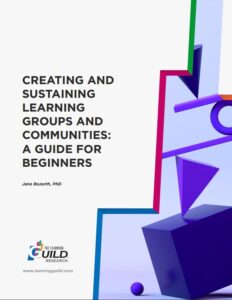David Kelly’s Curated L&D Content for the Week of 5/9/22

CEO, The Learning Guild
I read through a number of articles and blog posts each day as part of my professional development. Each week, I curate a few of my favorites, including a brief introduction explaining why I find the post to be of value, and recommend you read it.
Here’s a summary of this week’s content:
- The impact of cognitive bias on design
- Understanding the differences between LXPs and LMSs
- What the emerging creator market may mean for L&D
- A look at the new headsets Meta is developing and their potential role in the future of work
- An overview of micro-credentials and their value to workers
Design to Combat Cognitive Bias & Increase Inclusivity
Last month’s Learning Solutions Conference closed with a thought-provoking keynote from David Dylan Thomas exploring cognitive biases and the effect they can have on design. This post by Pam Hogle explores the themes of the keynote and how cognitive bias affects learning and our design of learning programs.
LXP Versus LMS: What Is the Difference?
The rise of learning experience platforms has introduced a growing question within our industry: Which platform is right for our organization? The answer lies first in understanding the differences between the two types of platforms, and this post by Brandon Williams explains both types of platforms and the key differences between them.
How The Creator Market Is Totally Disrupting Corporate Training
Platforms like YouTube, facebook, and more recently TikTok have ignited a new industry – the creator market. This post by Josh Bersin explains what the creator market is, and what it may mean for the world of L&D.
Meta’s ‘Project Cambria’ is for Work, Not Games
Virtual Reality has emerged as a viable tool for building immersive training experiences, but the role it plays in workplaces may be even greater in the future. This post by Ryan Dinsdale looks at new headsets being developed by Meta that are being built with work productivity in mind.
Micro-credentials – what they are and how they can help you
Micro-credentials (or open badges) have been available for a number of years, but interest in them has grown in recent years driven by the pandemic’s effect on the labor market. This post by Victoria Masterson provides a great overview on what micro-credentials are, how they work, and where they can provide value.
What Role Do Groups & Communities Play in Learning?
Group membership is a great way to satisfy social and psychological needs for connection and belonging. Scanning through the group offerings on most social sites gives the impression that many were driven by someone saying, “Hey, let’s start a group!” How is your group different from others? What can you do to set it apart?
In this research report, Creating and Sustaining Learning Groups and Communities: A Guide for Beginners, Jane Bozarth sheds light on groups, communities, communities of practice, how to orchestrate participation and membership, as well as how to nurture and sustain your groups and communities.


Leave a Reply